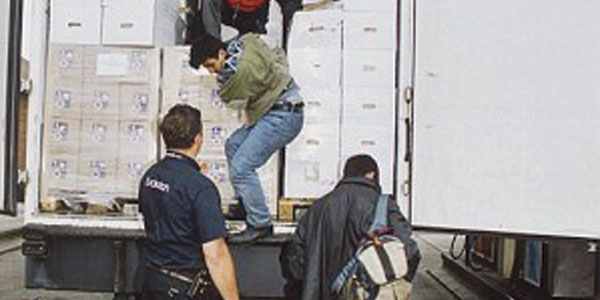
Varios países europeos han comenzado a utilizar una nueva tecnología para luchar contra la inmigración ilegal. Sin embargo, la nueva tecnología podría ser más adecuada para otros fines – al menos por ahora.
Inglaterra ha instalado escáneres especiales en Bélgica y Francia para interceptar inmigrantes ilegales que intentan llegar al Reino Unido. Los escáneres son máquinas detectoras de latidos cardíacos que pueden revelar la presencia de una persona oculta en un coche, entre piezas de carga, camiones y otros lugares donde se podría esconder una persona. De acuerdo con la empresa que ha desarrollado los escáneres, teóricamente, el sistema es capaz de distinguir entre un latido del corazón humano y un latido del corazón de los animales u otras vibraciones.
Desafortunada-mente, las máquinas – que han costado millones de dólares al gobierno para comprar e instalar – todavía no funcionan correctamente. Los sensores no han funcionado correctamente desde el día en que el gobierno los instaló.
De acuerdo con fuentes de noticias del Reino Unido, los sensores no pueden detectar la diferencia entre un latido del corazón humano y un latido del corazón de los animales. Lo que es peor aún, es que los sensores no pueden diferenciar entre un latido del corazón y otras vibraciones, tales como trenes y barcos. Muchas de las 28 máquinas instaladas por el gobierno británico están inactivadas. Los funcionarios explicaron que no hay razón para usar los sensores hasta que se resuelva el problema.
Un funcionario de Bélgica dijo que las máquinas sonaba muy bien, pero «han sido más o menos inútil yo que se pierde mucho tiempo buscando para no encontrar a nadie en los contenedores.»
En mi opinión, este método de lucha contra la inmigración ilegal no debe ser utilizado en los Estados Unidos hasta que el sensor y su software haya sido desarrollado lo suficiente para que la máquina pueda trabajar de forma constante y sea capaz de diferenciar los distintos tipos de vibraciones. Sin embargo, veo una gran oportunidad para este producto. Esta tecnología podría salvar cientos de vidas después de desastres naturales o ataques terroristas para encontrar personas que necesitan ser rescatadas.
Eso sería un objetivo muy adecuado para ello.
Heartbeat detector isn’t ready to fight illegal immigration
Commentary by Dermidio Juez-Perez
Countries in Europe are utilizing a new technology to fight illegal immigration. However, it would be better suited to other purposes – at least for now.
Great Britain has installed special scanners in Belgium and France to intercept illegal immigrants trying to reach the United Kingdom (UK). The scanners are heartbeat detector machines that can reveal the presence of a person hidden in a car, among pieces of cargo, in trucks and in other hiding places. According to the company that has developed the scanners, theoretically, the system is capable of distinguishing between a human heartbeat and an animal heartbeat or other random vibrations.
Unfortunately, the machines – which have cost the British government millions of pounds to purchase and install – have yet to work. The sensors haven’t worked properly since the day the government introduced them.
According to UK news sources, the sensors fail to detect the difference between a human heartbeat and an animal heartbeat. Even worse, the sensors cannot differentiate between a heartbeat and other vibrations, such as trains and ships. Many of the 28 machines installed by the British government are inactive. Officials explained that there’s no reason to use the sensors until the issue is solved.
A Belgium official said the machines sounded great, but “they have been more or less useless because we end up searching many containers and finding nobody inside.”
In my opinion, this method of fighting illegal immigration shouldn’t be used in the United States until the sensor and its software develop enough for this machine to work consistently and is capable of differentiating the various types of vibrations. However, I see a great opportunity for this product. This technology could save hundreds of lives after natural disasters or terrorist attacks to find people who need to be rescued.
That would be a purpose well-suited for it.










